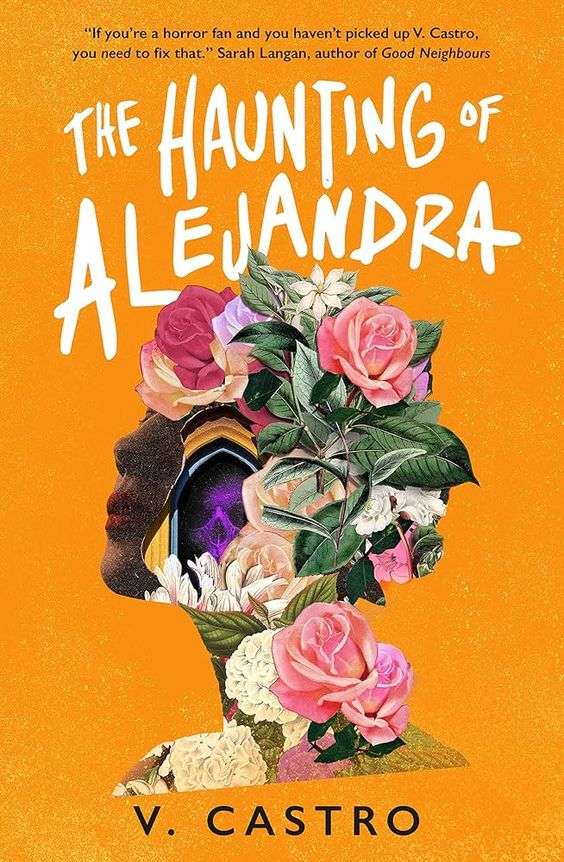We’ve implemented some new protocols around sending us messages via this website. Please email website “at” britishfantasysociety “dot” org for any issues.

For all things fantasy, horror, and speculative fiction
-
Announcement:

The Haunting of Alejandra
The Haunting of Alejandra by V. Castro
Titan Books, pb, £8.99
Reviewed by Sarah Deeming

Alejandra is all things to all people but nothing to herself. She tries to be the perfect wife and the perfect mother but feels she fails at both, and in her despair, Alejandra is tormented by visions of a weeping woman in white. She doesn’t know who she is anymore. In an attempt to find herself, Alejandra begins reconnecting with her Mexican roots, which have been denied her since she was first fostered, and in doing so, she uncovers her tragic family history. Generation of mothers hounded by the woman in white into abandoning their children or committing suicide. Countless daughters are raised by others, losing their heritage until they turn into they follow in their mother’s footsteps. A cursed family, and Alejandra is set to be the woman in white’s next victim unless she can break the cycle and learn to value herself.
The one thing no one warns you about when you become a mother is guilt, and The Haunting of Alejandra is an empathic story about the negative aspects of motherhood, including guilt and exhaustion. When we meet Alejandra, she is in a position all too many women will recognise, strung out and hiding from her family just so she can have five minutes without someone calling her name. In her exhaustion and borderline depression, she sees a crying woman in white. It really got me how vivid and visceral Alejandra’s mental health struggle is.
As excited as I was for this story, a Mexican folk story about La Llorona, I had a few issues with it. The first was that while the portrayal of the harder parts of motherhood and mental health was emotive and empathetic, I found the rest of the story a little 2-dimensional. Alejandra’s husband, Matt, is a self-centred man-child who sulks if she doesn’t play along with his image of a perfect family. Her estranged mother is a ridiculously successful doctor who dedicated her life to caring for others after giving up Alejandra for adoption after birth. Even Alejandra’s counsellor, Dr Melanie Oritz, doesn’t feel any more substantial than a collection of self-help mantras.
I also struggled with the ghost story element. As a horror fan, I was looking for something different, ghost stories and folklore from underrepresented cultures, so The Haunting of Alejandra really caught my eye. Unfortunately, I don’t feel like the book delivered what the blurb promised. I didn’t finish with a greater understanding of La Llorona, and I’m not sure Alejandra did either, as any greater understanding the reader had about the family’s curse comes through flashbacks and not Alejandra uncovering something for herself. I felt let down.
Those two niggles aside, I found the book’s strength lay in its depiction of denial. Alejandra is denied her emotions and made to feel ungrateful for wanting more from her life than just a mother. We also learn that, brought up in foster care by an American religious family, she wasn’t allowed to explore her Mexican heritage. These descriptions were heartbreaking.
Overall, The Haunting of Alejandra was a solid book with some bits that didn’t work and others that were interesting. I would recommend it, but not necessarily as a ghost story, but one of female empowerment.
Explore the blog:
Blog categories:
Latest Posts:
Tags:
#featured (56) #science fiction (25) Book Review (264) events (44) Fantasy (231) Graphic Novel (13) horror (136) Members (62) Orbit Books (48) profile (43) Romance (17) Science Fiction (50) short stories (28) Titan Books (52) TV Review (15)
All reviews
Latest Reviews:
- THE HOUSE ON THE BORDERLAND by William Hope Hodgson
- Monstrum by Lottie Mills
- Mood Swings by Dave Jeffery
- Yoke of Stars by R.B. Lemberg
- Hera by Jennifer Saint
- The Black Bird Oracle by Deborah Harkness
- RETURN OF THE DWARVES By Markus Heitz
- Delicious in Dungeon
- Toxxic by Jane Hennigan
- THIS ISLAND EARTH: 8 FEATURES FROM THE DRIVE-IN By Dale Bailey
Review tags:
#featured (2) Action (4) Adventure (4) Book Review (28) Fantasy (18) Featured (2) Feminist (2) Gothic Horror (3) Horror (14) Magic (3) Orbit Books (3) Romance (6) Science Fiction (5) Swords and Sorcery (2) Titan Books (7)